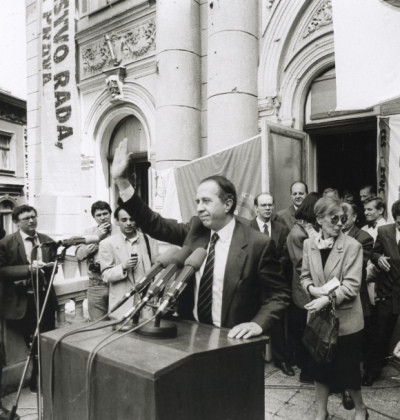The European Trade Union Confederation (ETUC) is deeply saddened to hear of the passing of Emilio Gabaglio, one of its founding fathers and longest standing leaders.
Born into a working class family in 1937, Gabaglio studied economics in Milan before returning to his home town of Como to begin his working life as a secondary school teacher. During this time he joined the Italian Confederation of Trades Unions (CISL) and rose to become head of its international department.
That role saw him help establish the ETUC in 1970s, as well as traveling across Europe and the world to support trade unionists fighting oppression. He attended the congress of banned trade unions during the Franco dictatorship in Spain, was part of a delegation to Poland in August 1980 to support the recently founded Solidarnosc, and travelled to Chile and Brazil to stand with workers against military regimes.
Those experiences made him the ideal candidate to become the third General Secretary of the ETUC in 1991. Under his leadership, the ETUC constructed a vision of a Social Europe to ensure that “the European Union must not be merely an economic construction.” That was, Gabaglio said, “what will distinguish us from the United States.”
That commitment, which he shared with then European Commission President Jacques Delors, delivered landmark pro-worker legislation like the Working Time Directive. He was a convinced European and signed the agreement enshrining social dialogue in the European treaties, something which remained one of his proudest achievements.
But he was also willing to move from the negotiation table to the streets when needed. Under Gabaglio, the ETUC organised a Eurodemonstration and day of action for employment and social Europe in 1993. More than a million workers took part in Brussels and 150 other locations, making it the biggest ever mobilisation during the history of the ETUC.
The organisation expanded rapidly under Gabaglio, who was twice re-elected. New members came from all traditions of trade unionism and all parts of Europe. In May 1994, he led a delegation to celebrate international workers' day in Sarajevo while it was under siege. “I don’t remember a single word of the speech I made,” he said, “but I will never forget the faces in front of me, full of determination and hope.”
It was an act that spoke to his inherent humanity as well his determination to live the values of the movement which he led. He continued to make himself available to advise the leadership of the ETUC to the end and we will move forward stronger towards a Social Europe thanks to his wisdom and legacy.

